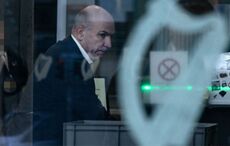Pope Francis has introduced new criminal legislation against child abuse in the Vatican and he has increased the liability of the Holy See's employees.
According to the AFP, the pope's decree has created 'a broader definition of the category of crimes against minors' which will now include child prostitution, sexual acts with children and child pornography.
The move came one day after a UN child rights committee blasted the Catholic Church for its international sex scandals, calling on the Vatican to release details 'of all cases of child sexual abuse committed by members of the clergy.'
'The Holy See is finally making up for a serious lag,' the international children's rights organization Terre des Hommes said in a statement.
The new legislation applies to a few thousand people directly employed by the Vatican in Rome and abroad. Sex abuse cases which take place in other countries will be dealt with under national legislations.
But the clerical sex abuse victims' group SNAP dismissed Pope Francis' decree as merely 'tweaking often-ignored and ineffective internal church abuse guidelines to generate positive headlines but nothing more.'
The pope's legal overhaul comports with the Vatican's desire for greater transparency in the wake of numerous corruption scandals.
The pope's reform will reportedly extend the reach of the legislation to the members, officials and employees of the various bodies of the Roman Curia, the central body of the Catholic Church.
The laws, which the Vatican said revise its "rather dated" criminal code, will come into force on September 1.
The latest moves are thought to be a direct consequence of the so-called Vatileaks scandal last year when former Pope Benedict's butler Paolo Gabriele published confidential documents from Vatican offices alleging widespread corruption and mismanagement.
Punishment will reportedly be increased for anyone stealing secret papers, from up to two years in jail and a fine for low-importance leaks, to up to eight years in prison if the documents concern the 'fundamental interests' of the Holy See.




Comments